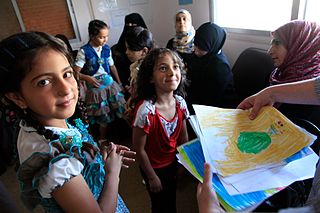FINANCIAL INTEREST DISCLOSURE: Nowrasteh has a paid job as immigration policy analyst at the Cato Institute (since April 15, 2012), and formerly had a similar role at the Competitive Enterprise Institute.
This post was originally published at the Huffington Post website here and is reproduced with the author’s permission.
The Syrian civil war has killed over 100,000 people and displaced as many as seven million — about one-third of Syria’s population. Russia’s offer to put Syria’s chemical weapons under international control may stop American military involvement, but the humanitarian crisis remains. The good news is military involvement isn’t necessary to help alleviate the humanitarian crisis. Instead, we can allow Syrian emigration to the U.S.
The number of refugees grows daily. Non-Muslim Syrians, who make up 13-to-15 percent of the population, are at particular risk. Christians, Druzes, and the non-religious face attacks from many rebel groups who are motivated by a violent interpretation of Sunni Islam. For instance, rebels from the extremist Jabhat al-Nusra rebel group recently conquered the Aramaic speaking Christian town of Maaloula — forcing most of the population to flee with only a handful of nuns and orphans left behind.
But Muslim Syrians are in grave danger as well. A mere 13 percent of Syrians — including President Bashar Assad and his government — are Shiites, compared to 74 percent who are Sunnis. Sunnis form the core of the rebellion, while Shiites generally support the government. Warring factions drawn along sectarian lines will extend and deepen the violence, killing non-combatants of all faiths in the cross-fire.
These conditions prompted a mass exodus from Syria, and it’s likely to continue. As the director-general of Sweden’s Migration Board, Anders Danielsson, has said: “The conflict in Syria has heated up, to put it mildly… we can assume that it’s not going to be resolved in the foreseeable future.”
Of the seven million displaced Syrians, two million have left the country altogether. So far, neighboring Lebanon, Jordan, and Turkey have taken in more than 1.7 million of the refugees. Sweden has announced that it will grant permanent residency to the 14,700 Syrian refugees already there, as well as some subsequent arrivals. Germany has also decided to take in 5,000 Syrian refugees.
In contrast, in 2011 and 2012, the U.S. allowed just 374 Syrians to gain asylum status, while only 60 refugees were approved. The Obama Administration has announced plans to let in 2,000 refugees — but those are only promises. Syrians already in the U.S. are allowed to stay and work under Temporary Protected Status (TPS) — as are many Haitians, Somalis, and others whose home countries are devastated, but that doesn’t help those trying to flee their war-torn country.
The United States used to be the world’s safety net for refugees, especially religious ones. The Pilgrims fled the Netherlands, Irish Catholics escaped English oppression, Jews from Eastern Europe escaped pogroms, and Armenians fled genocide and war to settle in California. But then America changed its immigration laws in 1921, and the government shamefully turned away German Jews fleeing Nazi Germany and Chinese fleeing the Japanese invasion.
The United States could help avoid an even worse humanitarian crisis in Syria by guaranteeing TPS status to all peaceful Syrians who make it to the U.S. It’s important to note that TPS is not a green card and cannot lead toward citizenship. Furthermore, any war criminals or individuals affiliated with criminal or terrorist activity would be excluded. TPS status could be a game-changer for Syrians and it could be done just by changing a few words in the U.S. code.
This sounds simple, but there will undoubtedly be questions about the results of such a move. How will the Syrians fare once they are in the United States? The answer: pretty well.
Syrian refugees would not burden the welfare state, since they would only have access to public education for their children and Emergency Medical Assistance. In fact, they’d likely find work, which is the best vehicle toward cultural and economic integration. According to a government report in 2010, 58 percent of recent adult refugees were employed — a rate higher than the U.S. born population. In Sweden, by contrast, only 30 percent of all immigrants are working even after they’ve been in the country several years.
Syrians in particular have proven successful in the U.S. Americans of Syrian descent have an average income of $56,000 and 66 percent of Syrian adults are in the workforce – higher than the 63 percent for U.S.-born Americans.
Allowing Syrians to get TPS upon landing in America is a cheap and effective way for Congress to limit the scale of the humanitarian disaster in Syria. President Obama and Congress’ interest in Syria is likely fleeting and focused primarily on WMDs, but the violence isn’t. TPS is already keeping some Syrians out of harm’s way. It’s time that Congress allows TPS to save more lives.
Open Borders note: See also Paul Crider’s blog post Taking our humanitarian impulses seriously.
The photograph of Syrian refugee children in Jordan that appears above this post was taken by Russell Watkins, and is licensed under the Creative Commons Attribution licence.

